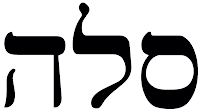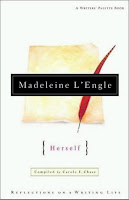 If you’ve read any Psalms, you’ve noticed the word selah. Hebrew—roughly translated, stop and listen. Let those with eyes, see, and with ears, hear.
If you’ve read any Psalms, you’ve noticed the word selah. Hebrew—roughly translated, stop and listen. Let those with eyes, see, and with ears, hear.
Far too often, we're busy tuning out. Our eyes glaze, and we don’t see. The dramatic wisdom of untold centuries rushes over our feet, fresh and cool and invisible.
But it only takes a moment to step onto the shoulders of a literary giant. To pursue wisdom. Seriously, why read Noel De Vries when you could be reading, say, Madeleine L'Engle? Here she is, from a compilation of her reflections on writing, Madeleine L'Engle: Herself. Enjoy the view. And selah.
Here she is, from a compilation of her reflections on writing, Madeleine L'Engle: Herself. Enjoy the view. And selah.
Being a writer does not necessarily mean being published. It’s very nice to be published. It’s what you want. When you have a vision, you want to share it. But being a writer means writing. It means building up a body of work. It means writing every day. You can hardly say that van Gogh was not a painter because he sold one painting during his lifetime, and that to his brother. But do you say that van Gogh wasn’t a painter because he wasn’t “published”? He was a painter because he painted, because he held true to his vision as he saw it.
The creative process has a lot to do with faith and nothing to do with virtue, which may explain why so many artists are far from virtuous; are, indeed, great sinners. And yet, at the moment of creation, they must have complete faith, faith in their vision, faith in their work.... The depth and strength of the belief is reflected in the work; if the artist does not believe, then no one else will; no amount of technique will make the responder see truth in something the artist knows to be phony.
[A Wrinkle in Time] was a theological as well as a literary enterprise for me, but as a storyteller I had to make the story come first.... The theology is down deep. It’s not there unless you look for it. And that’s where I think it should be in stories. It should not hang below your skirt like a slip.
Too much concern about Christian art can be destructive both to art and to Christianity. I cannot consciously try to write a Christian story. My own life and my own faith will determine whether or not my stories are Christian. Too much Christian art relies so heavily on being Christian that the artist forgets that it also must be good art.
Whether a story is to be marketed for grownups or for children, the writer writes for himself, out of his own need, otherwise the story will lack reality.... if it springs from the writer’s need to understand life and all its vagaries and vicissitudes, if it is totally honest and unselfpitying, then it will have the valid ring of truth. If it is written because it is what is at the moment fashionable, and not out of the writer’s need, then it is apt to be unbelievable, and what is unbelievably can often be shocking and even pornographic....
I am convinced that everybody, no matter how Protestant, lives by icons. An icon is a myth. An icon is that which was true, is true, and will be true. The great icon painters, if they’re painting a picture of Jesus, are taught that they cannot possibly paint what he looked like. No human being could presume to do that. The icon is not meant to look like him, but it is meant to have in it a mythic truth....
An icon is a symbol, rather than a sign.... [containing] within it some quality of what it represents. An icon of the Annunciation, for instance, does more than point to the angel and the girl; it contains, for us, some of Mary’s acceptance and obedience, and so affects our own ability to accept, to obey.
We do not draw people to Christ by loudly discrediting what they believe, by telling them how wrong they are and how right we are, but by showing them a light that is so lovely that they want with all their hearts to know the source of it.
Noel De Vries is a youth librarian percolating her second novel, a YA märchen set in 17th-century Holland. Visit Noel at Never Jam Today.























Thank you for sharing from L'Engle's work.
ReplyDeleteI was a fan of her writing, and One of my recent regrets was that I didn't get to meet her before she died. (But there's always heaven to look forward to!)
I enjoy this book. My sister gave it to me for my birthday several years ago.
ReplyDelete~ Wendy
I've been a fan since I was twelve, and I cried when she died. And then I cried when I was at a Jeffery Overstreet lecture and he choked up as he read that last L'Engle quote... she truly influenced so many writers.
ReplyDeleteThis was a wonderful reading today. Such thoughtful insights!
ReplyDeleteThanks for sharing this, Noel. Powerful thoughts.
ReplyDeleteWonderful! And thank you.
ReplyDeleteI could not have said it better. We end up preaching to the choir but it's not the choir that needs saving.
ReplyDeleteGood words to ponder.
Pointed words, going right to the heart of the debates about Christian fiction. Thanks for choosing the right words from this amazing author.
ReplyDeleteThanks for posting this! L'Engle is right on when she talks about Christian art trying too hard to be Christian that it loses its value as art.
ReplyDelete